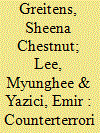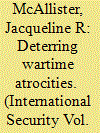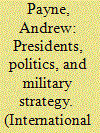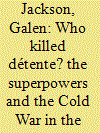|
|
|
Sort Order |
|
|
|
Items / Page
|
|
|
|
|
|
|
| Srl | Item |
| 1 |
ID:
170592


|
|
|
|
|
| Summary/Abstract |
International political outcomes are deeply shaped by the balance of power, but some military capabilities rely on secrecy to be effective. These “clandestine capabilities” pose problems for converting military advantages into political gains. If clandestine capabilities are revealed, adversaries may be able to take steps that attenuate the advantages they are supposed to provide. On the other hand, if these capabilities are not revealed, then adversaries will be unaware of, and unimpressed by, the real balance of power. Most of the existing literature emphasizes that states have few incentives to signal their clandestine capabilities. This conclusion deserves qualification: the condition of long-term peacetime competition can make signaling a profitable decision. Within this context, two important variables help determine whether a state will signal or conceal its secret capabilities: the uniqueness of the capability and the anticipated responsiveness of the adversary. An extended case study of Cold War strategic antisubmarine warfare confirms these predictions.
|
|
|
|
|
|
|
|
|
|
|
|
|
|
|
|
| 2 |
ID:
170591


|
|
|
|
|
| Summary/Abstract |
In 2017–18, the Chinese Communist Party (CCP) changed its domestic security strategy in Xinjiang, escalating the use of mass detention, ideological re-education, and pressure on Uyghur diaspora networks. Commonly proposed explanations for this shift focus on domestic factors: ethnic unrest, minority policy, and regional leadership. The CCP's strategy changes in Xinjiang, however, were also likely catalyzed by changing perceptions of the threat posed by Uyghur contact with transnational Islamic militant groups in Southeast Asia and the Middle East, and a corresponding increase in perceived domestic vulnerability. This threat shifted from theoretical risk to operational reality in 2014–16, and occurred alongside a revised assessment that China's Muslim population was more vulnerable to infiltration by jihadist networks than previously believed. Belief in the need to preventively inoculate an entire population from “infection” by these networks explains the timing of the change in repressive strategy, shift toward collective detention, heavy use of re-education, and attention paid to the Uyghur diaspora. It therefore helps explain specific aspects of the timing and nature of the CCP's strategy changes in Xinjiang. These findings have implications for the study of the connections between counterterrorism and domestic repression, as well as for authoritarian preventive repression and Chinese security policy at home and abroad.
|
|
|
|
|
|
|
|
|
|
|
|
|
|
|
|
| 3 |
ID:
170593


|
|
|
|
|
| Summary/Abstract |
Advocates of wartime international criminal tribunals (ICTs) hope that such tribunals can deter combatant atrocities against civilians. Yet, more than twenty-five years after the establishment of the first wartime ICT—the International Criminal Tribunal for the former Yugoslavia (ICTY)—wartime ICTs’ role in deterring such violence remains a matter of debate. Insights from criminology, as well as research on civil conflicts and international legal compliance, suggest that ICTs are most likely to deter government and rebel forces from committing atrocities against civilians when all three of the following conditions are present: (1) ICT officials have secured sufficient prosecutorial support, (2) combatant groups rely on support from liberal constituencies, and (3) combatant groups have centralized structures. Case studies of the ICTY's impact on fourteen combatant groups from the Yugoslav conflicts—combined with hundreds of field interviews with war veterans and others—confirm this prediction. The ICTY's record thus sheds important light on how and when contemporary wartime ICTs—including the International Criminal Court—might succeed in deterring combatant atrocities against civilians.
|
|
|
|
|
|
|
|
|
|
|
|
|
|
|
|
| 4 |
ID:
170595


|
|
|
|
|
| Summary/Abstract |
How do electoral politics affect presidential decisionmaking in war? As both commander in chief and elected officeholder, presidents must inevitably balance competing objectives of the national interest and political survival when assessing alternative military strategies in war. Yet, how and when electoral pressures influence decisionmaking during an ongoing conflict remains unclear. Drawn from the logic of democratic accountability, two mechanisms of constraint may be inferred. First, presidents may delay making decisions that are perceived to carry excessive electoral risk. Second, electoral pressures may have a dampening effect, causing presidents to water down politically sensitive courses of action to minimize any expected backlash. Recently declassified documents and interviews with senior administration officials and military figures illustrate these mechanisms in a case study of decisionmaking during the second half of the Iraq War. Both George W. Bush's surge decision of 2007 and Barack Obama's decision to withdraw troops in 2011 are shown to have been profoundly influenced by concerns related to the domestic political calendar. These findings call for further study of the nuanced ways in which the electoral cycle shapes wartime decisionmaking.
|
|
|
|
|
|
|
|
|
|
|
|
|
|
|
|
| 5 |
ID:
170594


|
|
|
|
|
| Summary/Abstract |
Standard explanations for the demise of U.S.-Soviet détente during the 1970s emphasize the Soviet Union's inability to put aside its communist ideology for the sake of a more cooperative relationship with the United States. Soviet resistance to reaching a stable accommodation during this period, many analysts maintain, was especially evident in the Middle East, where Moscow is said to have embraced the “radical Arab program” vis-à-vis Israel. Such accounts do not fare well, however, in light of the historical evidence. Instead, that evidence indicates that the Soviet Union was eager to cooperate with the United States to achieve an Arab-Israeli agreement. The Richard Nixon and Gerald Ford administrations, however, were not interested in working with the Soviets in the Middle East, and instead sought to expel them from the region. These findings have important implications for scholarly debates about whether great power rivals can cooperate on issues where their strategic interests are overlapping, as well as for contemporary debates over U.S. policy toward countries such as China, Iran, North Korea, and Russia.
|
|
|
|
|
|
|
|
|
|
|
|
|
|
|
|
|
|
|
|
|